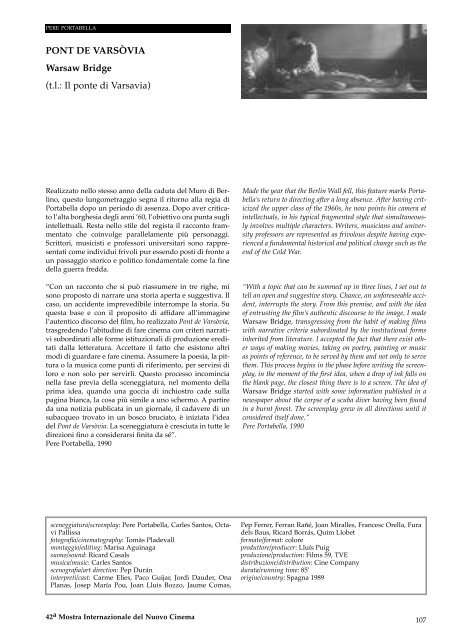Catalogo - Mostra internazionale del nuovo cinema
Catalogo - Mostra internazionale del nuovo cinema
Catalogo - Mostra internazionale del nuovo cinema
Create successful ePaper yourself
Turn your PDF publications into a flip-book with our unique Google optimized e-Paper software.
PERE PORTABELLA<br />
PONT DE VARSÒVIA<br />
Warsaw Bridge<br />
(t.l.: Il ponte di Varsavia)<br />
Realizzato nello stesso anno <strong>del</strong>la caduta <strong>del</strong> Muro di Berlino,<br />
questo lungometraggio segna il ritorno alla regia di<br />
Portabella dopo un periodo di assenza. Dopo aver criticato<br />
l’alta borghesia degli anni ’60, l’obiettivo ora punta sugli<br />
intellettuali. Resta nello stile <strong>del</strong> regista il racconto frammentato<br />
che coinvolge parallelamente più personaggi.<br />
Scrittori, musicisti e professori universitari sono rappresentati<br />
come individui frivoli pur essendo posti di fronte a<br />
un passaggio storico e politico fondamentale come la fine<br />
<strong>del</strong>la guerra fredda.<br />
“Con un racconto che si può riassumere in tre righe, mi<br />
sono proposto di narrare una storia aperta e suggestiva. Il<br />
caso, un accidente imprevedibile interrompe la storia. Su<br />
questa base e con il proposito di affidare all’immagine<br />
l’autentico discorso <strong>del</strong> film, ho realizzato Pont de Varsòvia,<br />
trasgredendo l’abitudine di fare <strong>cinema</strong> con criteri narrativi<br />
subordinati alle forme istituzionali di produzione ereditati<br />
dalla letteratura. Accettare il fatto che esistono altri<br />
modi di guardare e fare <strong>cinema</strong>. Assumere la poesia, la pittura<br />
o la musica come punti di riferimento, per servirsi di<br />
loro e non solo per servirli. Questo processo incomincia<br />
nella fase previa <strong>del</strong>la sceneggiatura, nel momento <strong>del</strong>la<br />
prima idea, quando una goccia di inchiostro cade sulla<br />
pagina bianca, la cosa più simile a uno schermo. A partire<br />
da una notizia publicata in un giornale, il cadavere di un<br />
subacqueo trovato in un bosco bruciato, è iniziata l’idea<br />
<strong>del</strong> Pont de Varsòvia. La sceneggiatura è cresciuta in tutte le<br />
direzioni fino a considerarsi finita da sé”.<br />
Pere Portabella, 1990<br />
sceneggiatura/screenplay: Pere Portabella, Carles Santos, Octavi<br />
Pallissa<br />
fotografia/<strong>cinema</strong>tography: Tomàs Pladevall<br />
montaggio/editing: Marisa Aguinaga<br />
suono/sound: Ricard Casals<br />
musica/music: Carles Santos<br />
scenografia/art direction: Pep Durán<br />
interpreti/cast: Carme Elies, Paco Guijar, Jordi Dauder, Ona<br />
Planas, Josep María Pou, Joan Lluis Bozzo, Jaume Comas,<br />
42 a <strong>Mostra</strong> Internazionale <strong>del</strong> Nuovo Cinema<br />
Made the year that the Berlin Wall fell, this feature marks Portabella’s<br />
return to directing after a long absence. After having criticized<br />
the upper class of the 1960s, he now points his camera at<br />
intellectuals, in his typical fragmented style that simultaneously<br />
involves multiple characters. Writers, musicians and university<br />
professors are represented as frivolous despite having experienced<br />
a fundamental historical and political change such as the<br />
end of the Cold War.<br />
“With a topic that can be summed up in three lines, I set out to<br />
tell an open and suggestive story. Chance, an unforeseeable accident,<br />
interrupts the story. From this premise, and with the idea<br />
of entrusting the film’s authentic discourse to the image, I made<br />
Warsaw Bridge, transgressing from the habit of making films<br />
with narrative criteria subordinated by the institutional forms<br />
inherited from literature. I accepted the fact that there exist other<br />
ways of making movies, taking on poetry, painting or music<br />
as points of reference, to be served by them and not only to serve<br />
them. This process begins in the phase before writing the screenplay,<br />
in the moment of the first idea, when a drop of ink falls on<br />
the blank page, the closest thing there is to a screen. The idea of<br />
Warsaw Bridge started with some information published in a<br />
newspaper about the corpse of a scuba diver having been found<br />
in a burnt forest. The screenplay grew in all directions until it<br />
considered itself done.”<br />
Pere Portabella, 1990<br />
Pep Ferrer, Ferran Rañé, Joan Miralles, Francesc Orella, Fura<br />
<strong>del</strong>s Baus, Ricard Borrás, Quim Llobet<br />
formato/format: colore<br />
produttore/producer: Lluís Puig<br />
produzione/production: Films 59, TVE<br />
distribuzione/distribution: Cine Company<br />
durata/running time: 85’<br />
origine/country: Spagna 1989<br />
107

















